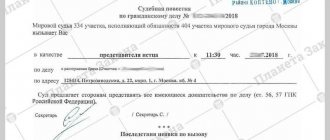Last modified: January 2021
Heirs have the right to claim property values based on the will of the testator or by law in the absence of a will. A completed application for inheritance is written evidence of the candidate’s intentions to become the owner of material assets that belonged to the deceased. Applicants will have to decide on the choice of a notary office and collect documentation within the allotted six-month period.
Where should an application for acceptance of inheritance be submitted?
The right to enter into an inheritance is vested in the citizen to whom the testator bequeathed it.
At the same time, any person can become such a citizen, regardless of family relations, if the testator considered him worthy to inherit property. Sometimes an inheritance can pass to a legal institution, for example, if the testator wanted to transfer his property to a children's institution as a charity.
To acquire an inheritance, the heir is required to submit a statement of readiness to enter into the inheritance to the notary who opened the will or other responsible person located in the area of the final place of residence of the deceased person.
He can submit a petition at will, either to a private notary or to a state notary who has opened a case for the acceptance of property. At the same time, he has the right to freely choose to perform certain actions.
These include:
- Acquisition of inheritance.
- Rejection of heritage, no matter the circumstances.
In both options, the heir is required to submit an application to the notary outlining his decision. Usually, the place of acquisition of the inheritance is located at its location.
Complaint against a notary
An interested person has the right to file a complaint against a notary if the latter does not perform notarial acts assigned to him by law.
The complaint is considered in a special proceeding by sending an application to the court. The subject of the complaint is incorrect notarial actions or refusal to perform them.
When sending a document to the court, the interested party must take into account the following aspects:
- Jurisdiction. The complaint is sent to the location of the notary (district courts deal with such cases).
- The application is submitted no later than ten days from the date of refusal or unlawful notarial acts.
- Only those persons whose rights were violated by the notary are authorized to file a complaint.
- If a notary unlawfully refuses to perform notarial acts, the interested person has the right to demand a written refusal. The notary cannot fail to comply with such an order.
What is the application deadline?
The acquisition of property from a deceased person must be carried out by the heirs within the time limits established by law.
The specific time for acquiring the right to the deceased's real estate is determined by regulations to protect both public and personal rights. Approved norms of Art. 1154 of the Civil Code provides for a general time period for most heirs during which they can enter into an inheritance, equal to six months. The beginning of the countdown of the established time is determined by the date of opening of the inheritance case (Article 1114 of the Civil Code of the Russian Federation), which occurs depending on the circumstances that became the reason for its initiation.
All other terms for acquiring an inheritance are regulated by Art. 1154 Civil Code, among which stand out:
- A special time for accepting an inheritance is equal to 6 months, the countdown of which begins from the date of entry into force of the decision of the judge who recognized the person as dead. (Article 1114 of the Civil Code).
- The special time for accepting the inheritance of a missing person is equal to 6 months, the countdown of which begins from the date of entry into force of the judge’s decision establishing the expected date of death (clause 1 of Article 1154 of the Civil Code).
- A special time for accepting an inheritance, equal to 6 months, is provided for other citizens who have the right to inherit as a result of the refusal of the inheritance of other heirs or their removal if recognized as unworthy (clause 2 of Article 1154 of the Civil Code)
- A special time for accepting an inheritance, equal to 3 months, established for persons who acquire the right to real estate as a result of non-acceptance by other heirs (clause 3 of Article 1154 of the Civil Code). Such time is counted after the completion of the generally accepted 6-month period, application from the date of opening of the heritage.
If the time established by law is missed, the testator still has a chance to acquire the inheritance if valid reasons for the missed time are given. The missed time may be returned by the court. With the consent of other heirs who did not miss the deadline, the citizen who missed the time can receive a share of the property without filing a claim with the judicial authorities (Article 1155 of the Civil Code).
Grounds for inheritance in the Russian Federation
The norms of Article 1111 of the Civil Code of the Russian Federation provide for only three grounds for entering into inheritance rights, in particular:
- by will;
- within the framework of the concluded inheritance agreement;
- according to the law, based on the proximity of blood relationship, but taking into account the priority.
Each of the above grounds has its own characteristics, both at the stage of the will and subsequent taking possession of the inheritance.
Inheritance by will
In pursuance of Article 1119 of the Civil Code of the Russian Federation, the testator has the right to dispose of his property as he wishes, identifying heirs both from among close relatives and complete strangers to the family, neighbors or friends, for example. Moreover, he can not only form a circle of applicants for his property, but also determine a share for each of them based on his own understanding.
At the same time, the testator is not obliged to notify anyone about the existence of a posthumous will, much less explain why he benefited some relatives and completely deprived others of their inheritance. His will is unshakable within the framework of the law - he is the owner. The only condition that to a certain extent limits his right is the rule enshrined in Part 1 of Article 1119 of the Civil Code of the Russian Federation.
So, regardless of the desire of the testator to transfer his property to certain persons, the obligatory share for disabled dependents must be determined, otherwise the same elderly mother, a minor child or a distant relative who is supported will allocate their part themselves, but in court.
How to find out if there is a will for inheritance
Receiving an inheritance under a contract
By virtue of Article 1140.1 of the Civil Code of the Russian Federation, the testator has the right to conclude an inheritance agreement with a future applicant for his property. In essence, this document can be compared with a will, but differences still exist. The agreement is a bilateral transaction, therefore the heir knows about the meaning of the last word, moreover, he agrees with the conditions for receiving the inheritance.
Moreover, in addition to the promise to transfer property in the future, the testator can determine for himself in the contract a lifelong maintenance or the provision of other services, and this takes into account the fact that the right to dispose of the bequeathed property remains with him. Such a document, of course, has many risks, but it guarantees the testator not only a peaceful old age, but also the possibility of gradually transferring affairs to the future heir during his lifetime.
Inheritance by law
The order of inheritance according to the law is carried out in order of priority, which is formed based on the proximity of family ties. So Chapter 63 provides for 6 official queues, but in fact there are seven of them. The first line includes the family, that is, the spouse, children and parents, the second includes brothers and nephews, the subsequent ones include other relatives in the descending line.
Moreover, all of the above persons can be called to inherit only if the testator, during his lifetime, has not determined his posthumous will in writing and has not left a will. Although it is possible that a testamentary disposition may be declared invalid, as well as the possibility of declaring some of the heirs specified in the will unworthy.
Procedure for filing an inheritance application
Legal methods for acquiring heritage, as well as the procedure for its registration, are regulated by paragraph 1 of Art.
1153 of the Civil Code of the Russian Federation. In accordance with it, the heir has the right to write a statement at the place of opening of the inheritance to a notary or other responsible person with similar powers (Article 1115 of the Civil Code). The established documents submitted by the heir have equal procedural effect for the acquisition of inheritance. When submitting a request for inheritance, you need to know that:
The legislation provides for 3 options for submitting a request - in person, through the post office or through an authorized representative.
When sending a request through a proxy or post office, an indispensable condition of the request is notarization of the authenticity of the heir's signature.
According to Art. 62 of the law on notaries, a request from heirs to acquire an inheritance must be provided in writing. It needs to display complete information:
- About the testator and the testator.
- Date of death and place of residence at the date of death.
- Availability of other heirs.
- Property location address.
- Indicating the date the request was filled out, etc.
The duty of the notary is to explain to the heir his rights and obligations arising as a result of the acquisition of the inheritance. At the same time, the heir has the right to refuse the inheritance, even after submitting a request for its acceptance within the specified time.
Algorithm of actions of the heir
To obtain a certificate of inheritance - the basis for registering ownership of inherited property, the legal successor must:
- Decide on a notary office. The notary accepts the application for acceptance of the inheritance at the place of opening of the inheritance case, which depends on a number of factors:
- storing a copy of the will;
- last registration of the deceased;
- location of the testator's real estate.
- Collect a package of documents confirming the identity and rights of the applicant to inherit:
- death certificate or a court decision that has entered into force declaring the testator dead;
- general passport identifying the applicant;
- an extract from the house register or a certificate from the housing office about the last place of residence of the deceased;
- documents confirming relationship with the testator when inheriting by law or for allocating a mandatory share to disabled dependents;
- legal and technical documentation for property assets.
- Drawing up and submitting an application for inheritance property with attached documents. To enter into property rights, two options are possible (Article 1153 of the Civil Code of the Russian Federation):
- only the acceptance of inherited values;
- acceptance of the property of the deceased with the issuance of a certificate of the right to inherit material assets.
- Pay the state fee for obtaining a certificate, calculated in a differentiated manner depending on the value of the inherited property and depending on family ties:
- 0.3% - for first-degree relatives;
- 0.6% for other candidates.
- Obtaining a certificate. If the application for inheritance was drawn up according to the “two in one” principle (acceptance of property and issuance of a certificate of inheritance rights), the state fee is paid and all documents are collected, then the next visit to the notary’s office must be made in six months to obtain the certificate.
- Register ownership of inherited tangible assets with the relevant government authorities:
- real estate objects - in Rosreestr;
- vehicles - to the traffic police.
When submitting an application to accept an inheritance, the heir is not required to provide evidence of kinship, dependency or marriage. Documentary evidence is necessary for issuing a certificate of rights to inherited property, since the issuance of a notarial document entails legal consequences associated with the transfer of ownership and recorded in the registration authorities.
How to correctly write an application for inheritance?
A probate purchase application refers to a document confirming the testator's desire to purchase property under a will.
At the same time, this document must be submitted in a timely manner. To draw up an application, take a sheet of paper in A-4 format. When drafting it, you must follow the rules for writing such official letters. A sample application can always be found at the notary, in addition, such a sample can be downloaded on the Internet, as well as at the end of this article.
The application for acceptance of inheritance must show:
- Detailed address of the notary's office, indicating the full name of the notary
- FULL NAME. the applicant, stating his residential address
This data is filled in in the upper right part of the sheet.
- Below, in the center of the line, fill in the name of the form and justification - “Application for acquisition of inheritance and...”
- Next, fill out the text of the application, which details the circumstances relating to the essence of the submitted form containing the information:
- about the deceased:
- Date of death.
- Place of residence.
- Other possible contenders.
- Grounds for inheritance:
- Will.
- According to the law.
If by law, then it is required to provide links to documents certifying the right to inheritance (marriage or birth certificate).
- A complete description of the inherited property.
- Requirement:
- Opening an inheritance case.
- Extract of certificate.
- Finally, the date of filling out the form and the signature of the testator are indicated.
Note. The application must be completed and submitted by the heir in person. A power of attorney is unacceptable in this situation.
In addition, you need to know that if there is more than one heir, then everyone must submit an application for inheritance.
If any of the heirs does not want to accept the inheritance, he is also obliged to submit a petition for refusal.
Which statement to choose
In an application for inheritance, the applicant may declare:
- entry into inheritance rights;
- complete renunciation of inherited property and rights to it;
- transfer of property to some other relative.
To perform each action, you need to submit the appropriate document. An heir interested in accepting property should write an application for acceptance of inheritance, which will be accepted by a notary.
Expert opinion
Kostenko Tamara Pavlovna
Lawyer with 10 years of experience. Author of numerous articles, teacher of Law
Having received this document, he will begin the inheritance case. Other relatives can also submit an application, and they are given the same period of time - six months.
How to submit an application
When a loved one dies, relatives are forced to start registering an inheritance. This process is not complicated, but you need to write a statement no later than 6 months after the death of a relative. Art. 115 of the Civil Code of the Russian Federation regulates that the inheritance is formalized at the place of residence of the heir.
- Registration of inheritance can be done through a notary or through a judicial structure. Registration through the judicial structure is carried out if the notary, for some reason, does not issue a document on the right to inheritance.
- Registration through a notary is carried out as follows:
- Within 6 months after the death of the testator, you must submit a request for inheritance to the notary. Documents certifying the right to receive it are attached to the application.
- After a 6-month period, you need to visit the notary again to complete the paperwork and purchase an inheritance document, which is subject to mandatory registration with the federal registration service in the event of receiving real estate.
- If the place of residence of the heir is unknown or the property is located in different places, then the documents are drawn up where the more valuable property is located.
- If the heir lives far away and is not able to personally submit the application, then he can send the application by mail or pass it through a trusted person. In this option, his signature must be certified by a notary.
- If the testator did not have time to formalize the inheritance in six months, then he will have to send a claim to the judicial authorities.
- When contacting a notary or judicial authorities, in addition to the application, the heir is obliged to provide documents (copy and original):
- Document confirming the death of the testator.
- Passport.
- A certificate from the place of residence of the heir (an extract from the house register is possible).
- Marriage certificate for the spouse of the deceased(s).
- Birth document.
- Certificate of change of surname for children and parents of the deceased.
- Documents related to ownership of real estate, a plot of land, a car and securities.
Law
According to the law, there are two main ways to accept an inheritance:
- By will . If there are several heirs, the determining factor is the will. If this document is written in favor of one of them, then this heir will have a clear advantage over the others. In essence, a will completely prevents other heirs from receiving property. However, there may be exceptions. For example, despite the will, socially vulnerable heirs must in any case receive their share of the property. This includes not only small children, but also other relatives who are recognized by law as disabled.
- Without a will . In the absence of such an administrative document, a certain queue is observed when entering an inheritance. Thus, close relatives, which include children, parents and spouses, are representatives of the first line of heirs. They have six months to submit the appropriate application to officially receive the inheritance. If this was not done, and in general they will not show any interest in the remaining property, second-degree relatives can receive it.
What is this
An inheritance is any property left by a deceased relative. The process of obtaining it is called inheritance. If it is properly registered, the heir receives the rights and property. However, you need to understand that until he goes through the procedure for accepting the inheritance, he cannot be the owner of the property left behind.
Inheritance can include more than just real estate. This includes cars, bank deposits, lost social benefits and any property that belonged to the previous owner before his death. You also need to know that some debts are inherited. This applies to loans, borrowings and fines that were accrued on them. It makes absolutely no difference to the creditor who exactly will repay the debt. The main thing is that it is returned.







